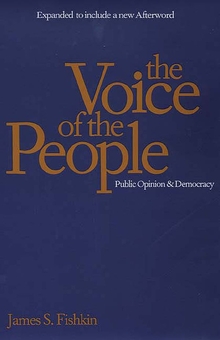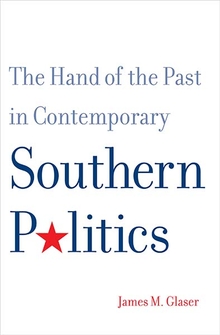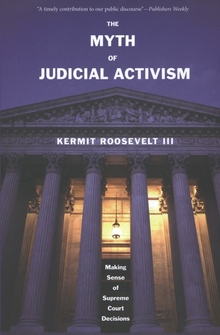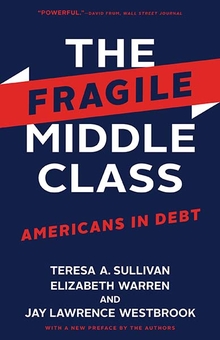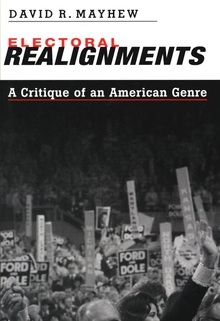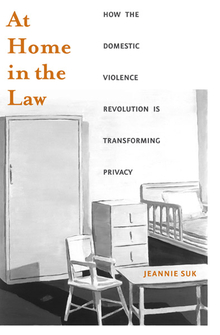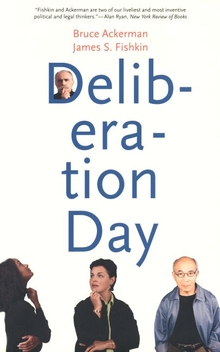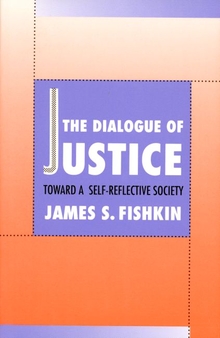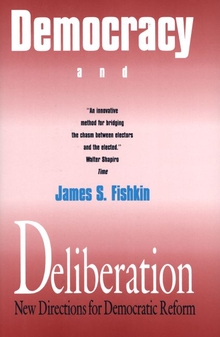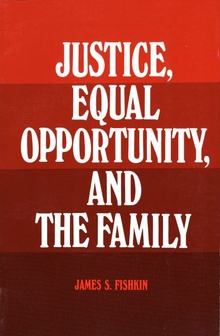The Voice of the People
WARNING
You are viewing an older version of the Yalebooks website. Please visit out new website with more updated information and a better user experience: https://www.yalebooks.com
Public Opinion and Democracy
James S. Fishkin; Expanded to include a new Afterword
In this lively book James Fishkin evaluates modern democratic practices and explains how the voice of the people has struggled to make itself heard in the past. He tells a fascinating story of changing concepts and parctices of democracy, with examples that range from ancient Sparta to America's founders to the first Gallup polls to Ross Perot. He then develops the rationale for a new method—the "deliberative opinion poll"—that uses modern media and survey research to legitimately rediscover the people's voice.
Fishkin's proposal for televised deliberative opinion polls has already been realized twice by the British television network Channel 4, and he discusses its implementation in the book. In January 1996, his deliberative poll will be seen in action in a "National Issues Convention" to be broadcast by PBS on the eve of the American presidential primary season. During this broadcast, a national random sample of citizens will interact with presidential contenders in order to reflect and vote on the issues and candidates. Fishkin discusses the pros and cons of this important event, giving behind-the-scenes details about preparations for it.
Here then is a compelling story of citizen deliberation from ancient Athens to the present, setting the context for future deliberative polls and related efforts to reinvigorate our public dialogue.
"Fishkin . . . a noted student of democratic institutions, hits the nail dead center. . . . Most persuasive."—Jonathan Yardley, Washington Post
"[The book] has impressive breadth, describing the influence of public opinion from Plato's cave to modern times."—Richard L. Berke, New York Times Book Review
"Fishkin has greatly enlivened debate about pubic opinion and democracy. . . . He offers an engaging view of the virtues of direct democracy."—Robert Y. Shapiro, American Political Science Review
"A book about a fundamental problem of American democracy. . . . Anyone. . . will find this slim, well-written volume an invaluable launching pad for further thinking and discussion."—Doris A. Graber, Political Science Quarterly
"Fiskin's thesis is that governments have lost touch with the 'voice of the people,' which has been submerged in a welter of polling, petitions and lobbying. [He wishes] to discover what people really believe—or would believe if they had a proper technique called Deliberative Polling. . . . Empowerment or enlightenment? A bit of both, perhaps."—Economist
"This book is both a thoughtful, thought-provoking, and highly readable critique of contemporary politics and government in the U.S. and a review of ideas and experiments to remedy shortcomings of current political practices and governmental arrangements. It will help us to rethink some of the basics of democracy."—Stanley Kelley, Jr., Princeton University
"The irrepressible Jim Fishkin is back...to do America's first deliberative public opinion poll."—Richard Morin, Washington Post
"Fishkin knows what is so easily missed in American politics. He knows that deliberation before people vote—not just voting by itself—is the key to making democracy work."—David Mathews, President, Kettering Foundation
"In his newest work James Fishkin blends his roles as a political theorist and a political innovator to produce a timely, and important book. It deserves to be read by everyone interested in possibilities for improving democratic institutions."—Robert A. Dahl, author of After the Revolution? Authority in a Good Society
"Fishkin has come up with an exciting concept that every concerned American should be excited about. It has the potential to dramatically change a generally detached electorate . . . into a far-better informed and involved body of voters. . . . Fishkin, in his way, is performing a terrific public service by bringing a new meaning to polling."—Jane Ely, Houston Chronicle
"James Fishkin is a great example of the engaged intellectual: the scholar who illuminates an issue, then does something about it. He knows that our Founders' faith in democracy rested not just in the people, but in the people's power to deliberate sensibly. His work enlarges the hope that we can restart the engine of deliberative democracy."—Ervin S. Duggan, President and Chief Executive Officer, Public Broadcasting System
"To experiment with the forms of democracy is every American's birthright. James Fishkin adds to this proud tradition with The Voice of the People. He experiments with traditional ideas about public opinion, and dares to propose a new one: the deliberative opinion poll. The result is that rare work of political science that is also an exercise in political imagination. In a word, a very American book."—Jay Rosen, Director, Project on Public Life and the Press, New York University
"Well worth reading. . . . Fishkin's book succeeds in conveying his enthusiasm for this important project."—Michele Kay, American-Statesman
"In his search for 'the voice of the people,' the author concludes that in contemporary American democracy, the public's opinion, while highly valued by government officials, is poorly informed and poorly measured. . . . For the citizen seriously interested in the future of American democracy, this book is highly recommended."—Thomas J. Baldino, Library Journal
Publication Date: August 25, 1997

